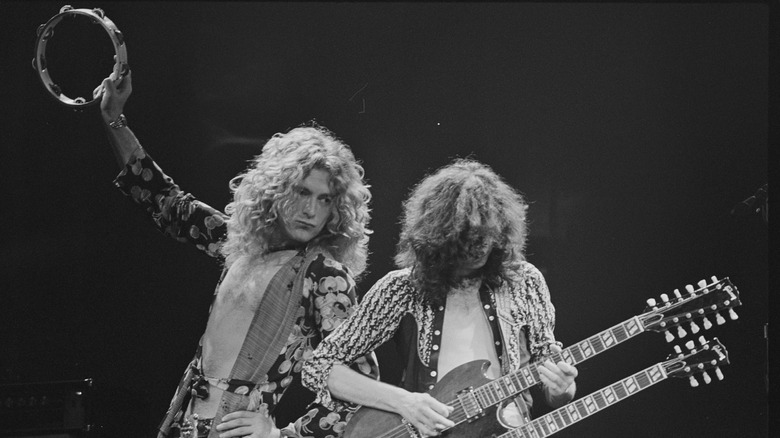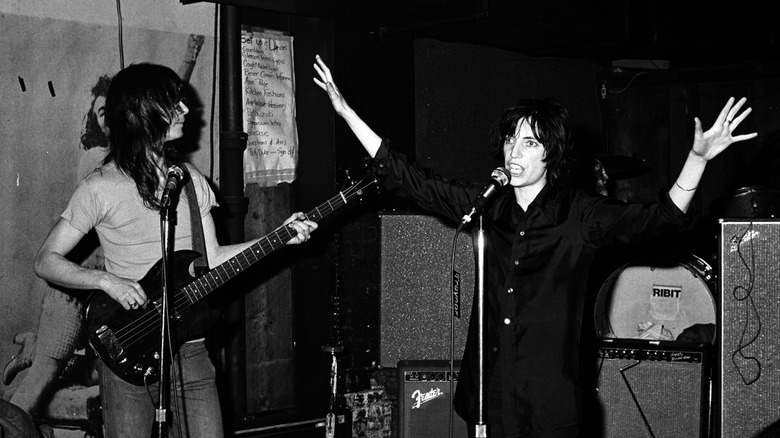5 Rock Songs From 1975 That Sound Even Cooler Today
The mid-1970s was a transitional time in the world of popular music. Soul music was hitting its stride, with the Stevie Wonder album "Innervisions" announcing his transformation from child star to pioneering mature artist, setting the template for the sound of the genre for years to come. Meanwhile, funk had well and truly arrived, and disco was becoming a major trend across the Western world, while jazz was increasingly being deployed to add complexity to mainstream songs by artists such as Quincy Jones and Lonnie Liston Smith.
Rock had dominated the pop charts in one form or another since the 1950s, culminating in the Beatlemania of the mid-1960s. But by the mid-1970s, The Beatles had long since split up and had been going in their own separate directions since 1970. At the same time, rock music in general was taking on new forms, with prog rock, metal, and a generation of bands later dubbed "proto-punk" laying the groundwork for more innovations in the later part of the decade, including the seismic punk explosion.
And despite 50 years of musical evolution having taken place since then, an astonishing amount of music from the era still stands the test of time and continues to inspire fresh generations of artists. Here are just five songs from 1975 that are even cooler today.
Patti Smith – Gloria
Patti Smith has achieved legendary status in the years since she released her debut album, "Horses," in 1975. Indeed, she has also come to be associated with high cultural respectability, having published acclaimed books, sung at Bob Dylan's Nobel Prize for Literature ceremony, and been awarded the Polar Music Prize for her life's work in the genre.
But all that reverence may perhaps fail to convince potential listeners of how truly disruptive Smith was when she arrived on the New York music scene in the mid-1970s. However, the opening track to "Horses," which contains one of Smith's early poems blended with a cover version of Them's "Gloria," still hits hard today. Opening with the immortal line "Jesus died for somebody's sins, but not mine," the track builds to a cacophony that prefigures the punk explosion of the latter part of the decade. Listen to "Horses" in its entirety, and it's impossible not to come to the conclusion that a great many new wave and punk acts were actually trying their best to sound as unique and rule-breaking as Smith and her musicians on her debut record, an act that, half a century later, remains hard to follow.
David Bowie – Fame
The mid-1970s were also a transitional period for some prominent artists who, looking back, came to define the era. One of these was David Bowie, the British rocker who, barely a decade into his career, had already undergone a series of radical changes in style as he adopted different personas and genres in pop music's greatest example of intentional and artistically-inspired transformation.
By 1975, Bowie had already been through his Ziggy Stardust era — during which, in the guise of a rockstar from Mars, he built a sizeable cult following — and taken Ziggy to America on the 1973 album "Aladdin Sane," before killing off his greatest creation and turning to different personas. His turn at narrative-led dystopian theatricality in the form of Halloween Jack of the "Diamond Dogs" era had also passed. Now, on "Young Americans," he was looking to the States once again, turning soul and gospel music to his own devices — he called his version "plastic soul" — the title track seeing Bowie adopting a fuller but somehow colder vocal style. And in New York he found a new collaborator: ex-Beatle John Lennon, who was shortly to take a five year hiatus from the music industry.
With Lennon's assistance, Bowie scored his first U.S. No. 1 hit with the track "Fame," a pioneering funk-rock cut about the vacuity of celebrity. It remained a live concert mainstay throughout his career and pointed the direction for his commercial peak in the 1980s with "Let's Dance," with which "Fame" shares many stylistic similarities. Indeed, the 1987 live version from the "Glass Spider" tour is considered perhaps the greatest single performance of the song.
Aerosmith – Walk This Way
Aerosmith may finally have come to an end due to the health complaints that have regularly afflicted lead singer Steven Tyler in recent years — not that he has retired completely, having appeared on stage with Slash and Joe Perry in September 2025 — but their incredible five-decade career stands out in the annals of rock music. During that time, they have had several commercial peaks, including an astonishing resurgence in the 1990s thanks to ballads such as "I Don't Want to Miss a Thing," which, despite being an enormous hit, may not have aged as gracefully as many of the tunes that helped them make their name as a leading American rock band in the 1970s.
The most obvious contender for an Aerosmith classic that still sounds fresh and exciting today is "Walk This Way," their 1975 smash that hit the Top 10 on its first release. The song's irresistible main riff, catchy chorus, and springy proto-rap verses make it especially memorable. And indeed, the song was such a dancefloor hit that it attracted the interest of one of the 1980s' biggest names: hip-hop trio Run-D.M.C., who, rather than simply sample "Walk This Way," invited Aerosmith to perform on a new version that incorporated more rap elements. The result was a crossover colossus that hit No. 4 on the Billboard Hot 100 and bridged rock and hip-hop successfully for the first time. That so many elements of the original remain in the 1980s version — which is still a dancefloor filler to this day — is testament to the lasting appeal of the source material.
Bruce Springsteen – Born to Run
Bruce Springsteen's 1975 masterpiece "Born to Run" is arguably easy to overlook today as a casual listener, due both to its continued airplay 50 years down the line, as well as the fact that in many ways it sounds like the definition of stadium rock. But put the song in context and it soon becomes clear that "Born to Run," taken from the studio album of the same name, has been considered one of the great rock tracks ever since its release for a reason.
Springsteen was on album number three by 1975, the first two of which had established him as a songwriter of the streets concerned with the lives, loves, and losses of everyday people, but which hadn't exactly made him into the voice of a generation. That was all to change with the "Born to Run" album, the title track of which contains all the elements that would later be regarded as Springsteenisms: finely honed lyrics and imagery, adrenaline-pumping riffs, and overblown orchestration that contrasts with the small-scale dramas of his characters. Stadium rock as we know it in all its soaring glory likely wouldn't exist if it weren't for the sound Springsteen pioneered with "Born to Run," and it still makes you want to pump your fist as much as anything you've ever heard.
Led Zeppelin – Kashmir
While the punk movement of the late 1970s saw many bands taking rock music back to basics, in 1975 several legendary bands were still looking to go big. And few bands went as big as Led Zeppelin, who released one of their finest-ever songs that year: "Kashmir," from their sixth studio album "Physical Graffiti."
It's difficult to imagine now, but in their early days, Led Zeppelin weren't held in the high regard they are today. Far from being the paragon of hard rock, they faced continued attacks from the music press who didn't see the value in their extremely heavy twist on blues and folk. "Physical Graffiti," and "Kashmir" in particular, were intended as a riposte to the criticism they faced, wide in their scope of ambition both in terms of composition and performance. And the band delivered, with many believing that "Kashmir" is the quintessential Led Zeppelin recording.
Frontman Robert Plant thinks the same. "I wish we were remembered for 'Kashmir' more than 'Stairway to Heaven,'" Plant said in an interview with Louder long after the dust had settled. "It's so right; there's nothing overblown, no vocal hysterics. Perfect Zeppelin."
So why these songs?
Look, there is one world-beating song that some readers will be screaming is not on this list: "Bohemian Rhapsody." Queen's operatic masterpiece is, it seems, more popular than ever, a singalong standard that everybody loves. But can it really be considered cool? Arguably not.
"Coolness" is, of course, incredibly subjective, and this short list has been compiled by taking into account other factors that make the songs above especially notable. The first thing to say is that these songs each have the distinction of having exerted an enormous influence on what came after them, either in the work of other artists or in that of their creators themselves. Carving a new path in which others may follow is definitely pretty cool, and while Queen are one of the defining rock bands of the 1970s, it can't really be said that "Bohemian Rhapsody" is a template for modern artists in the way the other songs above continue to be.
Another aspect of rock music that makes the genre cool to begin with is its swagger, and the songs above each see their performers delivering the goods in the coolest way possible. And at the end of the day, isn't that what rock music is all about?

